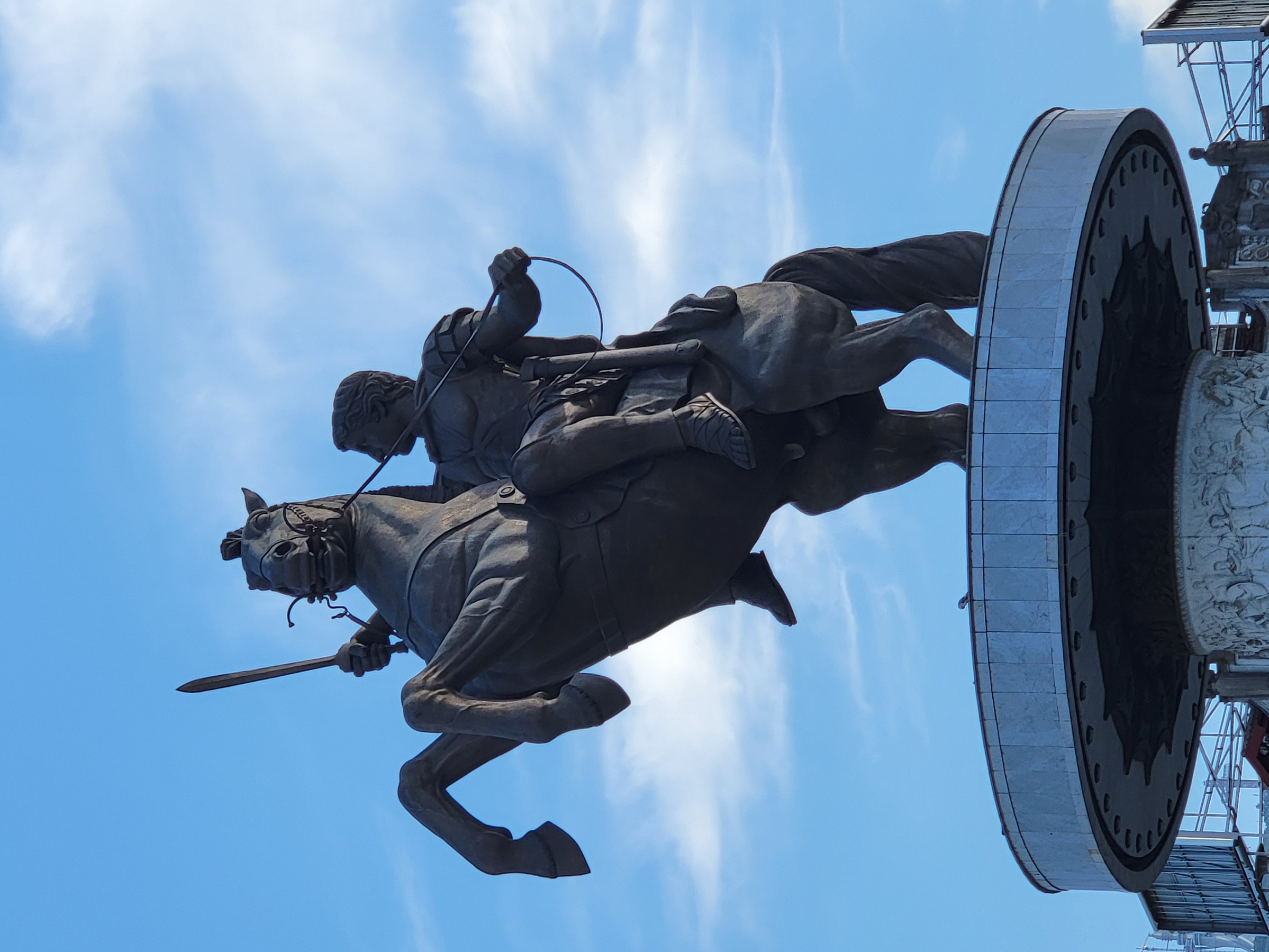04 - Great Expectations: Alexander’s Influence on Modern Macedonia
This past weekend I travelled to the capitol of North Macedonia, Skopje. While Skopje itself has a rich history still visible back to Byzantine times, the region is nearly as old as western civilization itself. The Macedonian people tie their modern identity, strongly, to the ancient Macedonians, most notably, Alexander the Great. (Though the modern Greeks would dispute such a claim)
Philip II of Macedon, Alexander’s father, successfully conquered the region that corresponds to present-day North Macedonia. Upon becoming king in 359 BCE, Philip focused on consolidating his power and securing Macedon's borders. He implemented significant military reforms, including the introduction of the phalanx infantry formation, which played a crucial role in his military successes. Philip's strategic campaigns against the Illyrians and Thracians extended Macedonian influence northward, bringing the region of modern North Macedonia under his control.
In addition to military prowess, Philip II utilized strategic marriages and alliances to strengthen his kingdom. His marriage to Olympias, a princess from Epirus, and other marital alliances helped secure loyalty and support from various regions. This combination of military and diplomatic strategies ensured the stability and expansion of Macedon.

The region of present-day North Macedonia was economically and militarily significant, providing strategic trade routes and serving as a buffer against northern tribes. The incorporation of this area into Philip's kingdom facilitated the spread of Greek culture and influence, setting the stage for Alexander the Great's future conquests. Philip's successful expansion of Macedon laid the groundwork for his son's legendary campaigns across Asia, fundamentally shaping the historical and geopolitical landscape of the Balkans.
Alexander the Great, born in 356 BCE in Pella, the capital of Macedon, was the son of King Philip II and Queen Olympias. From a young age, Alexander displayed remarkable intelligence and ambition, qualities that were further honed under the tutelage of the philosopher Aristotle. His education included philosophy, science, medicine, and literature, preparing him for both leadership and conquest. When Philip II was assassinated in 336 BCE, Alexander ascended to the throne at the age of 20.
Upon becoming king, Alexander swiftly consolidated his power by quelling rebellions and securing the loyalty of the Greek city-states. He then embarked on an ambitious campaign to conquer the Persian Empire, a mission driven by a desire to continue his father's legacy and by his own vision of a vast, unified empire. Alexander's military genius and strategic acumen were evident in his string of victories, including decisive battles at Granicus, Issus, and Gaugamela. His ability to inspire and lead his men, combined with innovative tactics, allowed him to overcome numerically superior forces.
Alexander's conquests extended beyond Persia into Egypt, where he founded the city of Alexandria, which became a major center of learning and culture. He continued his campaign through the Persian heartland, reaching as far as India. Despite facing fierce resistance, he managed to secure several victories, but the harsh conditions and long duration of the campaign eventually led to dissent among his troops. In 323 BCE, at the age of 32, Alexander died in Babylon, leaving behind a vast but fragmented empire.

Though the modern Macedonians claim the heritage of Alexander’s Empire, the connection is not so direct. Much has happened in the two-thousand years since the collapse of the Empire. After Alexander's death, his empire was divided among his generals, known as the Diadochi, leading to the formation of Hellenistic kingdoms. The region of Macedon, including parts of modern North Macedonia, came under the control of the Antigonid dynasty. However, by 168 BCE, Macedon was incorporated into the Roman Republic, becoming a Roman province and experiencing significant Roman cultural and political influence.
Following the decline of the Roman Empire, the region experienced invasions and migrations by various groups, including the Goths, Huns, and Slavs. By the 6th and 7th centuries, Slavic tribes had settled in the area, significantly altering its demographic and cultural landscape. The region later became part of the Byzantine Empire, and subsequently, the First Bulgarian Empire, and then the Byzantine Empire again. In the late medieval period, it was incorporated into the Serbian Empire before falling under Ottoman rule in the 14th century. Ottoman control lasted for over five centuries, leaving a lasting impact on the region's culture, architecture, and societal structures, including strong attempts at Islamification.
The 19th and early 20th centuries were marked by national awakening movements and struggles for independence throughout the Balkans. For North Macedonia, intellectuals and activists began to promote the idea of a unique Macedonian identity, distinct from neighboring ethnic groups. Key figures like Krste Misirkov, who authored the seminal work "On Macedonian Matters" in 1903, played a pivotal role in advocating for the recognition of the Macedonian language and culture. Misirkov emphasized the importance of developing a standardized literary language and preserving folk traditions, which were seen as crucial components of national identity.
The late 19th century saw the rise of revolutionary movements aimed at liberating the region from Ottoman rule and asserting Macedonian autonomy. The Internal Macedonian Revolutionary Organization (IMRO), founded in 1893, became a significant force in the struggle for independence. IMRO organized uprisings, most notably the Ilinden–Preobrazhenie Uprising in 1903, which, despite its ultimate failure, galvanized national consciousness and drew international attention to the Balkan cause.
During the Balkan awakening, intellectuals, historians, and nationalists sought to create a continuous and glorious historical narrative for the Macedonian people. Alexander the Great, as one of history's most renowned conquerors and a symbol of ancient Macedonian greatness, became a central figure in this narrative. By emphasizing the ancient roots of the Macedonian people and their connection to Alexander's empire, these narratives aimed to instill a sense of pride and historical legitimacy.
Alexander the Great served as a powerful symbol of national identity and cultural heritage. In the face of competing nationalisms from neighboring countries like Greece, Bulgaria, and Serbia, Macedonian activists highlighted their connection to Alexander to assert their distinctiveness. This association was used to counter claims that Macedonians were merely a subset of other ethnic groups. The legacy of Alexander the Great provided a prestigious and unifying historical figure around which the Macedonian identity could coalesce.

Following the Balkan Wars (1912-1913) and World War I, the region became part of the Kingdom of Serbs, Croats, and Slovenes (later Yugoslavia). After World War II, it was established as the Socialist Republic of Macedonia within the Socialist Federal Republic of Yugoslavia. With the dissolution of Yugoslavia in the early 1990s, the country declared its independence in 1991, initially as the Republic of Macedonia.
The newly independent “Macedonia” faced challenges, including a long-standing naming dispute with Greece, which was resolved in 2019 with the Prespa Agreement, leading to the country being officially renamed North Macedonia. Today, North Macedonia is a parliamentary republic, a member of international organizations like the United Nations, NATO, and aspiring to join the European Union.